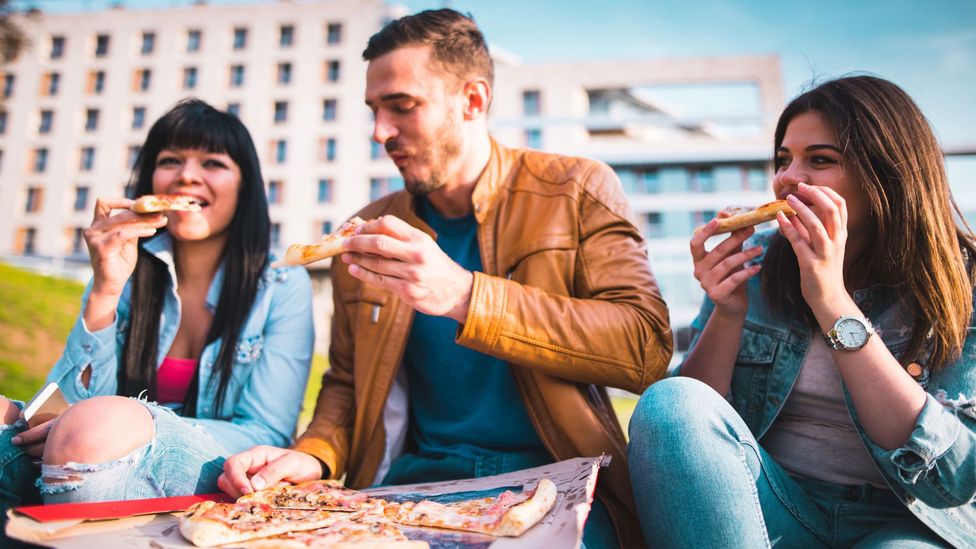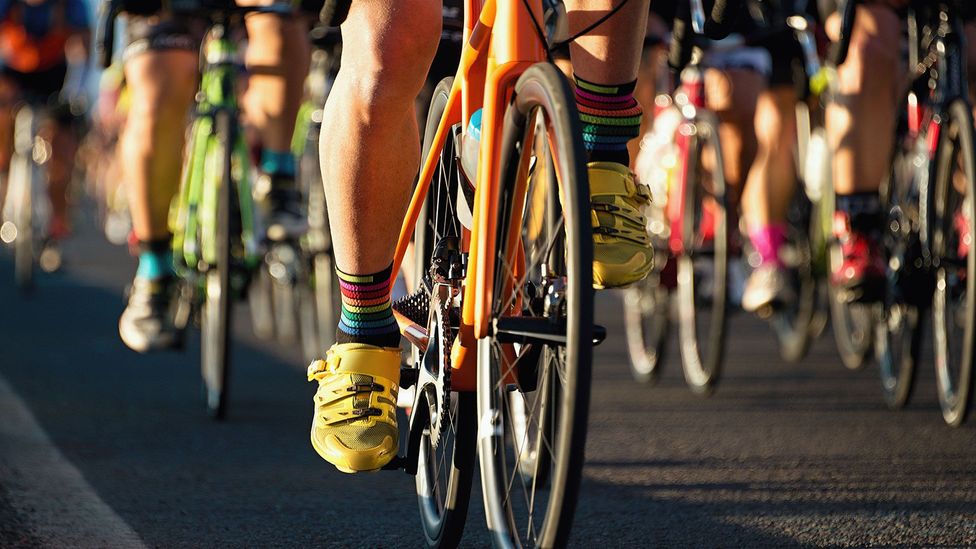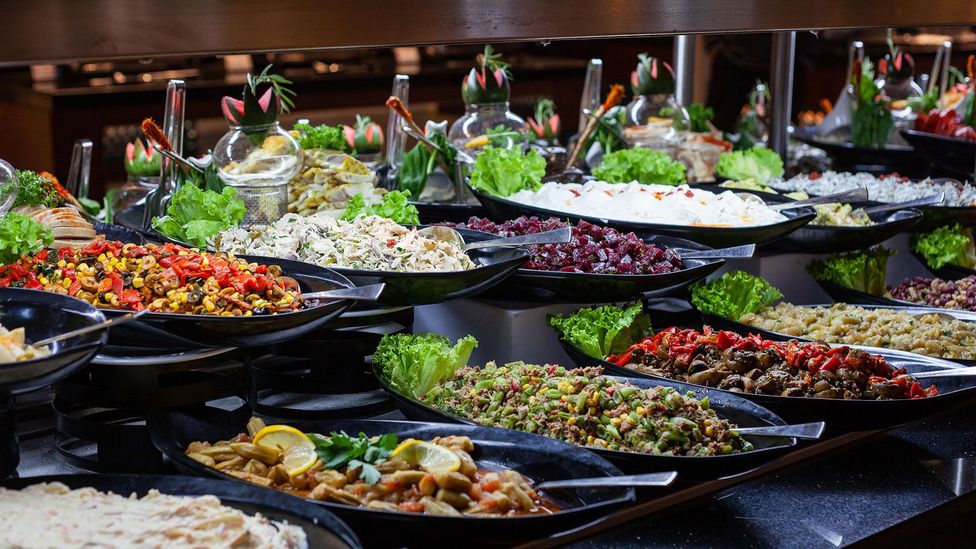Identify Three Environmental Factors Influenced by Family That Affect Human Behavior.brainly
How your friends alter your habits - for better and worse
(Image credit:
Getty Images
)

Our wellness choices are constantly influenced by our friends, both consciously or unconsciously.
W
Nosotros often think that self-control comes from within, nonetheless many of our actions depend merely equally much on our friends and family unit as ourselves. Those nosotros environs ourselves with have the power to brand united states fatter, drink more booze, intendance less about the surround and exist more risky with sun protection, among many things.
This is non simply peer pressure level, in which you deliberately act in a sure manner to fit in with the group. Instead, it is largely unconscious. Beneath your awareness, your encephalon is constantly picking up on cues from the people around you to inform your behaviour. And the consequences can exist serious.
It is at present well accepted that our personal sense of self is derived from other people. "The more of your identity you draw from a group, even when y'all're not around that grouping, the more likely you are to uphold those values," says Amber Gaffney, a social psychologist from Humboldt State University. "If a large office of how you identify is equally a student from a sure academy, or like me an academic, and so that's what you have with yous into near interactions with others. I run across things first through my lens as an bookish." Students, for case, tend to take stronger attitudes towards things similar legalising drugs or supporting environmental sustainability than the balance of the population.
These are chosen social norms. And while these norms are usually stable, some interesting things happen if just one person in the associated group acts out of character.

Environmental options like cycling are popular among students - but hearing a single dissenting vocalization can change your perceptions of the social norm (Credit: Getty Images)
Consider the following report, which found that people were likely to modify their opinion on greenish travel if they institute out their peers were acting hypocritically.
The students from Humboldt Land University reside in a small-scale, socially liberal boondocks in northern California which takes pride in its environmental credentials. The students at that place are largely very environmentally witting, too. You lot would expect that a peer's disregard for carbon emissions would not become down well.
Later on listening to an interview with a educatee at the university who stressed the importance of walking or cycling short distances rather than taking a automobile, and then later admitting to driving to the interview, the participants were asked about their own environmental views. They did this while sat side by side to an thespian. The actor took the role of either a third student wearing a university sweatshirt, or a professional in smart habiliment. When the hypocrisy of the interviewee was revealed, the role player either made a negative remark about their behaviour or stayed placidity.
Yous might also enjoy:
- The dark side of believing in true love
- How accurate are our first impressions
- Why meeting another's gaze is so powerful
How the participants judged the importance of walking or cycling curt distances was dependent on who they listened to the interview with, and how that person reacted. When sabbatum with someone they thought was another student, and who shared their environmental values, the participants reiterated the importance of cycling. When sat with an outsider information technology wasn't so clear cut.
An outsider who commented on the hypocrisy of the interviewee elicited the strongest ecology feelings in the participants. By defending the interviewee from criticism, they reinforced their own view that cycling was important. This is possibly because they felt the interviewee might unremarkably be more environmentally responsible. Conversely, if the outsider stayed tranquillity, the participants judged the importance of cycling the lowest. So, how an outsider judges our peers has a big impact on whether nosotros back them upwards or not.
"This was an interesting study," adds Gaffney, "because we were able to brand some people intendance less nigh the environment. Normally this isn't something that we would actively want to do, but understanding where these views come from could help u.s. to nudge people in the other direction."
In the confront of criticism by a stranger, nosotros might come to the assistance of our peers. But if left to form our ain opinions, we interpret the hypocritical behaviour as a sign that we tin can relax our own views. This is called vicarious dissonance.
"Vicarious dissonance is when y'all see someone behave in a way inconsistent with your attitudes, so you change your attitudes," says Gaffney. "I should exist embarrassed by seeing you act in a non-ecology mode, but that doesn't always happen. I won't necessarily start copying you, but I volition change my attitudes to reflect your behaviour because I feel similar to you and I see yous every bit an extension of myself."
This study was inspired by several pieces of work in Commonwealth of australia on vicarious dissonance around sun protection employ. Again, someone interim hypocritically would relax people's attitudes around applying protection, where the norm is to be extremely vigilant.

The dangers of lord's day exposure are well known - but our friends' behaviour tin pb usa to forget the risks (Credit: Alamy)
How nosotros talk nigh our health choices with friends tin also accept a significant impact on our decisions, both positively and negatively. Talking about an anti-smoking campaign with friends reduced people's cigarette intake, perhaps because those conversations gave smokers the opportunity to work out which information was most relevant to their lifestyles – then act on it. This is supported by a meta-analysis of 28 studies totalling 139,000 participants.
"The leading crusade of death is preventable health behaviours like smoking and obesity, and nosotros have admission to a vast amount of information online but we even so fume and we still don't exercise," says Christin Scholz of the University of Amsterdam. "Anything our friends do influences the states in ways that we are witting of or not. Their presence tin decide whether we act on that health data or ignore it."
Scholz asked college students in the US if they had talked to anyone virtually a recent feel involving booze, and whether those conversations were positive or negative. If they had talked positively nigh alcohol consumption they were more than likely to drink more than the adjacent day, and vice versa. These patterns are highly influenced, though, past the social circumstances that we observe ourselves in.
When we make decisions we are constantly reassessing the value we might get from each choice – a process called value maximisation. Our decision to have the stairs rather than a lift is dependent on how much we ate at lunch, if we have already been for our daily run and whether we walked into the building with our triathlete colleague. No effect of a chat with friends can always be viewed in isolation. And that is why our willpower fluctuates.
"Say I have a conversation with a friend the day before most some of the negative sides of alcohol but the next day I am in a bar with other people – I would still contend that conversation has some form of influence on me," says Scholz. "However, it's a pretty uncomplicated representation of human decision making. We're not ever [very] rational – we make these decisions pretty speedily. The importance of sure types of information changes through the twenty-four hours."
Our choices are influenced by who we are with when we are asked the question, how those people reacted, any conversations we might take had beforehand and our fundamental understanding of what is normal for that group of friends. Simply, if nosotros're still in uncertainty, the easiest affair to do is to look at what others are doing and re-create them. We practise this all the time, and we might not realise the impact it has.
"When nosotros eat with others we have a natural trend to use their behaviour every bit a guide," says Suzanne Higgs, who studies the psychobiology of ambition at the University of Birmingham. "Lots of studies accept shown that when nosotros swallow with people who swallow a lot, we eat more. People aren't oftentimes aware they are being influenced in that way. They might say information technology was the taste or the price or hunger levels rather than the people around them."

The other diners at a eating house may decide whether you consume your veg (Credit: Getty Images)
The miracle was first described based on an analysis of food diaries by John de Castro in the 1980s. These detailed diaries listed what people ate, but also where, when and who with. He was then able to command for the furnishings of celebratory meals, whether booze was consumed, if the meal took place at the weekend and whatsoever other factors that might have influenced the amount of food eaten.
These furnishings have since been repeated in laboratories. Higgs asked students to eat lunch either with a friend or in isolation in a lab. It appears to happen even when you are eating with 1 other friend in a very controlled environment. Only, this effect only occurs with people that you know well.
Higgs suggests that the presence of another person clouds our power to option up on cues from our bodies that we are satisfied. The normal process of feeling full is disrupted by feeling stimulated by our friends. Other distractions, like watching Television receiver, have been shown to increment nutrient consumption.
Side by side, Higgs took her research into the field to run across if eating behaviours could exist influenced by other social cues. She wanted to encourage people to choose vegetable side dishes by providing information about the choices of other diners using posters. "Of course we know that explicitly maxim 'Vegetables are salubrious' doesn't work," says Higgs. Instead, the posters displayed fabricated information about which side dishes well-nigh customers bought. Higgs put a vegetable side dish at the top.
"These posters merely described the behaviour of other people – and that'southward enough for some," says Higgs. "When we enter a new environment, nosotros look for cues about how to behave. Then, to see that a certain choice is the most popular actually helps us out."
The effect was seen even after the posters were taken down. Higgs had created a new norm.
"In that location is proficient reason to believe that when nosotros utilize normative behaviour information technology makes us feel practiced because we're connecting with a social group," says Higgs. "If yous are with a new social grouping, you are more probable to imitate behaviours."
Our decisions might non e'er be in our hands. But this also means nosotros can use our influence for skilful. "The aforementioned way a negative behaviour can spread through a network of people a positive one can spread through a network," says Scholz. "We've evolved to live in a group to spread positive actions and to seek the blessing of others."
--
William Park is @williamhpark on Twitter.
Join one million Futurity fans by liking the states on Facebook , or follow us on Twitter or Instagram .
If you lot liked this story, sign upwardly for the weekly bbc.com features newsletter , called "The Essential List". A handpicked selection of stories from BBC Future, Civilization, Uppercase, and Travel, delivered to your inbox every Friday.
blanchardhomplever.blogspot.com
Source: https://www.bbc.com/future/article/20190520-how-your-friends-change-your-habits---for-better-and-worse
Posting Komentar untuk "Identify Three Environmental Factors Influenced by Family That Affect Human Behavior.brainly"